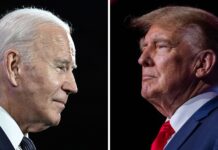The leading dollar index carved out another 2018 high Wednesday as interest-rate differentials continued to hold up the U.S. unit.
Dollar gains were held in check, however, as haven currencies, chiefly the Japanese yen and Swiss franc, drew mild interest with fresh North Korea worries appearing to weigh on sentiment. Pyongyang overnight signaled that its leader, Kim Jong Un, might pull out of next month’s summit with President Donald Trump if the U.S. insists on denuclearization for the isolated nation.
Meanwhile, the euro slumped to a five-month low below $1.18 amid reports that a possible future Italian coalition government would seek debt forgiveness from European creditors.
What are currencies doing?
The ICE U.S. Dollar Index
DXY, +0.24%
was up 0.3% at 93.52. The index, which pits the buck against a basket of six major peers, earlier hit a high of 93.55, another fresh 2018 marker. Though struggling for traction over the last few sessions, the index has been on an almost unchecked rise since mid-April, during which it flipped its year-to-date performance to positive.
A broader measure of the greenback, tracking 16 rival monetary units, the WSJ Dollar Index
BUXX, +0.10%
rose 0.1% to 86.98.
The euro
EURUSD, -0.4224%
fell 0.4% at $1.1792 versus $1.1837 late Tuesday in New York. The euro also fell sharply against the safe-haven Swiss franc, to a five-week low of 1.1799 francs.
Read: The euro could rally to $1.30 within 12 months, says currency strategist
The British pound
GBPUSD, -0.1481%
fell to $1.3492 compared with $1.3505 on Tuesday.
The greenback did slip versus the haven yen
USDJPY, -0.13%
pulling back from the January highs hit earlier this week, and last buying ¥110.14 compared with ¥110.35 Tuesday.
Also check out: Argentina may be headed for another currency crisis
Don’t miss: Turkish lira hits historic low as Erdogan eyes control of country’s central bank
What is driving the market?
Global political developments drove financial market Wednesday. A senior North Korean official said Pyongyang isn’t interested in a summit with the U.S. focused solely on denuclearization and accused Washington of trying to “impose on our dignified state the destiny of Libya or Iraq.”
In a Wednesday statement attributed to Kim Kye Gwan, a senior foreign ministry official, North Korea said it doesn’t want to deal away its nuclear weapons for economic compensation or benefits. That cast doubt on the North’s willingness to proceed with a planned June 12 summit with President Donald Trump in Singapore.
Elsewhere, the euro fell as much as half a percent to $1.1783, its lowest since late December, after reports surfaced that Italy’s antiestablishment 5 Star Movement and far-right League plan to ask the European Central Bank to forgive 250 billion euros of debt. The draft was obtained by Huffington Post Italia.
Italy’s FTSE MIB
I945, -2.50%
slumped 1.4% to 23,965.48. The yield on 10-year Italian government bonds rose 7 basis points to 2.016%, according to Tradeweb.
The euro had been a top performer in 2018, initially outshining a U.S. dollar expected to be plagued by U.S. trade and budget deficits. Instead, bets that the Federal Reserve will outpace its central bank counterparts with higher interest rates over the coming several months and signs the eurozone’s economy recovery has peaked has reversed that entire euro strength. The shared currency is now down 1.8% in 2018.
The interest-rate differential is reflected in the U.S. government bond market. The 10-year note yield
TMUBMUSD10Y, -0.21%
was down slightly Wednesday after its recent rise, but it remains above 3%, after hitting the highest level for the benchmark since 2011 in recent sessions.
The yen, meanwhile, barely budged after data showed Japan’s economy contracted for the first time in nine quarters during January-March, a factor that typically might tug the currency lower.
Check out: Why it may be downhill from here for the U.S. dollar
What are strategists saying?
“Rising tensions in the Middle East and a possible breakdown in the growing detente with North Korea, plus falling stock markets and a big jump in VIX, all make for a good background for the ‘safe haven’ currencies,” said Marshall Gittler, chief strategist at ACLS Global. “In particular, speculators looking to sell euro apparently bought Swiss franc.”
“While the relationship between the dollar and longer-term U.S. yields had faded in late 2017 and early 2018, that correlation seems to have returned in the second quarter of 2018,” said Marios Hadjikyriacos, a currency strategist at brokerage XM. “Markets are becoming slightly more confident in the Fed delivering three more rate increases this year.”
What else is in focus?
An April report on U.S. housing starts is slated to hit at 8:30 a.m. Eastern Time, with economists polled by MarketWatch forecasting 1.29 million starts.
At that same time, Atlanta Federal Reserve President Raphael Bostic is due to address the economic outlook at Georgia’s Augusta Cotton Exchange.
Check out: MarketWatch’s Economic Calendar
At 9:15 a.m. Eastern, investors are due to get April data on industrial production, with 0.6% growth expected.
In other assets, U.S. stocks looked set to struggle for direction on Wednesday, with fresh North Korea worries appearing to weigh on sentiment. Dow Jones Industrial Average futures
YMM8, -0.06%
inched lower by 13 points, or less than 0.1%, to 24,647, after a small early gain evaporated.
Source : MTV










